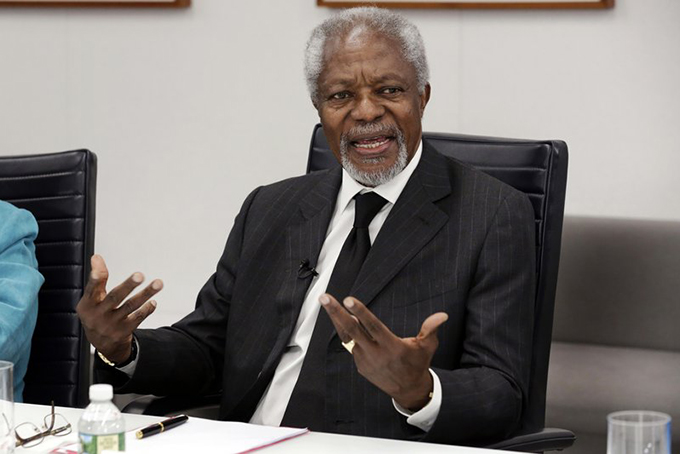This Week In Black History December 27, 2023 – Jan 2, 2024
Denzel Washington attends special screening of “FENCES” in Pittsburgh. (Photo by Duane Prokop/Getty Images for Paramount Pictures)
1873—William A. Harper, one of the most gifted Black artists of the 20th century, is born in Cayuga, Canada. He was a student at the Henry O. Tanner Art Institute in Chicago. Unfortunately, his brilliance was cut short by tuberculosis. He died in Mexico at the age of 36 in 1910.
1956—Segregation is outlawed on public buses in Tallahassee, Fla. The decision followed a six-month long boycott by the city’s African-American population. The boycott was patterned after the Montgomery, Ala., bus boycott sparked by Rosa Parks’ refusal to give up her seat to a White man.
1816—The American Colonization Society is organized by Robert Finley with the aim of returning Blacks to Africa. Ironically, it received support from two groups with opposing interests. Some abolitionists and philanthropists who wanted to end slavery supported the ACS with the hope of giving slaves a chance to start new, free lives in Africa. Meanwhile, some slave owners supported the ACS because they saw it as a way of ridding the country of free Blacks who they saw as stirring up trouble among Blacks who were still enslaved. It is estimated that at this time, there were 2 million enslaved Blacks and 200,000 free Blacks in America. In 10 years, the ACS returned nearly 3,000 Blacks to Africa. They helped to form what are today the West African nations of Liberia and Sierra Leone. Indeed, the first president of Liberia was an American Black who had returned to Africa.
1905—Legendary Jazz great and pianist Earl “Fatha” Hines is born on this day in Duquesne, Pa., near Pittsburgh. He was in a class by himself and a major influence not only in Jazz but also upon the Swing and Bebop eras of American popular music. He collaborated with such greats as Louis Armstrong, Charlie Parker, Sarah Vaughn and Dizzy Gillespie. He died in 1983. Among his best known hits were “Stormy Monday Blues” and “Second Balcony Jump.”
1954—Movie star Denzel Washington is born on this day in Mt. Vernon, N.Y.
1939—One of the most outstanding educators of the 20th century, Kelly Miller, dies in Washington, D.C. He was a champion of education for Blacks and was among that group of more radical Blacks who opposed the accommodating policies of Booker T. Washington. In 1887, Miller became the first African American admitted to Johns Hopkins University. He became a long-time professor and dean at Howard University, while also being a prolific writer, essayist and newspaper columnist.
1928—R&B music legend Bo Diddley is born Ellas Bates on this day in McComb, Miss. He was inducted into the Rock & Roll Hall of Fame and received Lifetime Achievement Awards from the Rhythm and Blues Foundation and a Grammy Award from the National Academy of Recording Arts and Sciences. He was known in particular for his technical innovations, including his trademark rectangular guitar.
1929—Sigma Gamma Rho Sorority is officially incorporated. The international Black sorority was actually organized Nov. 22, 1922, by seven teachers in Indianapolis, Ind. It is currently headquartered in Cary, N.C., with the theme: “Sisterhood, Scholarship and Service.”
1929—A Black boycott of unfair store hiring practices begins during the Great Depression. The “Don’t Buy Where You Can’t Work” campaign began in Chicago with the picketing of a chain of stores. It soon spread to New York, Los Angeles, Cleveland and several other major cities.
1862—This day has become known as “Watch Night”—the eve of the Emancipation Proclamation going into effect and nominally freeing slaves in the Confederacy. Thousands of free Blacks gathered in various locations throughout the nation to “watch” for midnight when the Emancipation of slaves became the law of the land. A focal point for celebration was the home of abolitionist Frederick Douglas in Rochester, N.Y.
1804—Jean Jacques Dessalines proclaims the independence of Haiti from France. The island nation, after the United States, becomes the second independent republic in the Western Hemisphere. The chief slogan of his independence speech was “Live free or die.” The Haitian war of independence had actually begun in August of 1791. The leader and greatest hero of that war was a former slave who worked as a carriage driver—Toussaint L’Ouverture. As a general, L’Ouverture was comparable to, and in some respects superior to, America’s George Washington and France’s Napoleon Bonaparte. However, under the ruse of discussing peace, L’Ouverture was tricked into traveling to France where he died in prison in April of 1803. The Haitians nevertheless prevailed over the French under the leadership of Dessalines and he was able to declare independence on this day in 1804.
1854—Lincoln University becomes one of the first institutions of higher learning for Blacks in America when it is incorporated as Ashmun Institute in Oxford, Pa., on this day in 1854.
1863—The Emancipation Proclamation becomes law. Like many of the pro-Black measures taken by President Abraham Lincoln, the Emancipation, while welcomed by Blacks, reflected many contradictions. First of all, it only freed slaves in the South—an area of the country over which Lincoln at the time had no effective control. Further, it did not free slaves in the Border States. And even in the South, it exempted from nominal freedom slaves in 13 parishes in Louisiana, including New Orleans; 48 counties in West Virginia; and seven counties in Virginia, including Norfolk.

1997—Kofi Annan of Ghana becomes the first Black Secretary General of the United Nations.
1997—The notorious Robbens Island off the coast of South Africa, the prison that held legendary Black freedom fighter Nelson Mandela for 27 years, was converted into a museum.
1831—William Lloyd Garrison (1805- 1879), one of the great White heroes of Black history, begins publishing the anti-slavery newspaper, The Liberator, in Boston. Garrison was a fiery and strong-willed abolitionist who believed in the “immediate and complete” end of slavery. Thus, he ran afoul of not only the pro-slavery crowd but also those anti-slavery activists who favored a gradualist approach to the problem. He was so militant that he was imprisoned for libel because of his criticism of a merchant involved in the slave trade and at one point the state of Georgia offered a $5,000 reward for his arrest and conviction. According to Garrison, when it came to fighting slavery he was opposed to “timidity, injustice and absurdity.” His oft-repeated slogan as editor of The Liberator was, “I am in earnest; I will not equivocate; I will not retreat a single inch; and I will be heard.”
1837—The first National Negro Catholic Congress is held in Washington, D.C.
1898—Brilliant scholar Sadie Tanner Mossell Alexander is born. She was the first Black woman to receive a doctorate in economics in America. She accomplished that feat in 1921 at the University of Pennsylvania at the age of 23. Later she earned a law degree and in 1927 became the first Black woman admitted to the Pennsylvania bar. She came from a distinguished family of educated and accomplished Blacks. She died in 1989.
1915—One of America’s most prominent historians, John Hope Franklin, is born. Perhaps his best known work on Black history is “From Slavery to Freedom.”

MEDIA MOGUL OPRAH WINFREY stands beside a newly commissioned portrait of herself that unveiled at the National Portrait Gallery on Dec. 13, along with Chicago-based artist Shawn Michael Warren, who painted the portrait. (Credit: Ja’Mon Jackson/The Washington Informer)
1954—Oprah Winfrey, talk show queen and Black America’s first recognized billionaire, is born in Kosciusko, Miss. (There is some debate. Winfrey may have been the second Black billionaire after Black Entertainment Television founder Bob Johnson.) Winfrey retired from the “Oprah Winfrey Show” in 2011 and started her own network named OWN.

